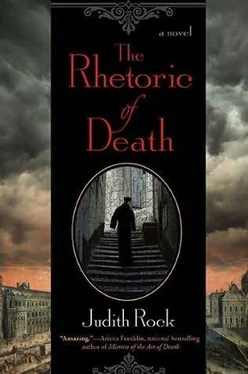Judith Rock - The Rhetoric of Death
Здесь есть возможность читать онлайн «Judith Rock - The Rhetoric of Death» весь текст электронной книги совершенно бесплатно (целиком полную версию без сокращений). В некоторых случаях можно слушать аудио, скачать через торрент в формате fb2 и присутствует краткое содержание. Жанр: Исторический детектив, на английском языке. Описание произведения, (предисловие) а так же отзывы посетителей доступны на портале библиотеки ЛибКат.
- Название:The Rhetoric of Death
- Автор:
- Жанр:
- Год:неизвестен
- ISBN:нет данных
- Рейтинг книги:3 / 5. Голосов: 1
-
Избранное:Добавить в избранное
- Отзывы:
-
Ваша оценка:
- 60
- 1
- 2
- 3
- 4
- 5
The Rhetoric of Death: краткое содержание, описание и аннотация
Предлагаем к чтению аннотацию, описание, краткое содержание или предисловие (зависит от того, что написал сам автор книги «The Rhetoric of Death»). Если вы не нашли необходимую информацию о книге — напишите в комментариях, мы постараемся отыскать её.
The Rhetoric of Death — читать онлайн бесплатно полную книгу (весь текст) целиком
Ниже представлен текст книги, разбитый по страницам. Система сохранения места последней прочитанной страницы, позволяет с удобством читать онлайн бесплатно книгу «The Rhetoric of Death», без необходимости каждый раз заново искать на чём Вы остановились. Поставьте закладку, и сможете в любой момент перейти на страницу, на которой закончили чтение.
Интервал:
Закладка:
“Thank you, mon camarade. Until tomorrow, then.”
Slowly, the men stepped back and let Charles through. He spoiled his attempt at a dignified exit by tripping over the bare feet of a fisherman who was sitting against a barrel beside his pole, so sound asleep beneath his hat that he never stirred. Charles was too excited at having found his man to mind the porters’ jibes and laughter.
On the way back to the college, he barely noticed the raucous street life going on around him. If Pierre had seen a knife in the rider’s hand as he reached toward Antoine, then the accident was indeed no accident. And if the man confirmed that Guise had paid him for silence, then Charles had a weapon against Guise and his cronies, and Guise had an unpleasant amount of explaining to do.
Charles was reaching for the bell rope beside the college postern when furious female voices reached him from beyond the chapel’s west door. Marie-Ange ran out of the bakery with her mother on her heels.
“You will never go up there again!” Mme LeClerc shouted. “Never, do you hear me? Do you want to get us turned out? Now be off with you. And come back the moment you’ve finished. Not like yesterday. I know how long delivering bread should take, Marie-Ange.”
“But, Maman! It wasn’t me that-”
“Go!”
Marie-Ange hefted her loaded basket and her mother went back into the shop. When the little girl was past the chapel, she set the basket down and wiped her wet face on her skirt.
“My lady Jeanne?” Charles squatted down on his heels in front of her. “What has happened, ma petite? Are the English winning again?”
Marie-Ange hiccupped indignantly. “I was only trying to help. But grown-ups never think of that, do they, the pigs?”
Charles considered gravely. “No, sometimes we don’t.”
“Well, it’s not fair!”
“I agree. How were you trying to help?”
“We were just-”
“Marie-Ange, go! Now!”
Mme LeClerc was coming toward them, brandishing a bread paddle that could have flattened a horse. With an expressive look at Charles, Marie-Ange picked up her basket and went. Her mother raised the bread paddle to heaven.
“Some days, maitre, she makes me wish I’d been a nun!”
“Celibacy has its rewards, madame,” Charles said dryly. Though lately, he was finding them hard to remember.
“Come in here for a little moment, maitre, if you please.”
She retreated into the shop and Charles followed her. The scent of baking wafted from the ovens and he took a deep, hungry breath.
“Your shop smells so good, madame, a man could eat the air.”
“A man may have to, if Roger lets that omelette brain of an apprentice burn my brioches.” She bit her lip and her rosy face grew pinched with apology. “Maitre, this morning Marie-Ange went up your stairs. I am so sorry! I would never have allowed it, but what could I do, I didn’t know!”
“What stairs, madame?”
“There.” She pointed to a low, arched door in the shop’s side wall. “They lead to two rooms above us. In Roger’s father’s day, the family lived up there. But when Roger inherited the bakery, the college took back the rooms. Since then, we live down here and that door has always been locked. I have not seen the key in an eternity. Now Marie-Ange swears she found it open. Mon Dieu, I only hope no one saw her up there!”
“Calm yourself, madame, if someone had seen her, believe me, you would know by now.”
“You really think so? Well, that is a relief, but-”
“Beatrice,” a male voice boomed from the back of the shop. “I need you!”
Someone else yelped and the voice rumbled angrily. The air was suddenly tinged with the smell of burning.
“Roger! Ah, Sainte Vierge, Roger, use your nose if you can’t use your ears! He is deaf as a baguette, maitre. And I wish I were, the way he snores! I tell you, sometimes-Guy, you cabbage head, save the brioches!” Brandishing the bread paddle, Mme LeClerc clattered away, her wooden sabots loud on the stone floor. “Roger, I have told you and told you-”
Hoping that Guy and Roger were fast on their feet, Charles went quickly to the little door and opened it. Narrow, deeply worn stone stairs rose into darkness. He hesitated, then pulled the door shut behind him, abruptly cutting off both light and sound, and began to climb. He felt his way up two switch-back flights, to the level of his own rooms as far as he could tell, and found himself facing another low-arched door. No light showed around its edge. He pinned an ear to the door’s planks, heard nothing, and with infinite caution lifted the latch. The door opened soundlessly and then balked, and an eddy of dust made him clap a hand over his nose to stop a sneeze. A length of thick wool hung over the inside of the door. Charles edged it aside enough to see into the room beyond it. He stared at a sliver of a book-littered desk. If he was right about the floor he’d reached, this could well be Guise’s study. And he had found Antoine standing in front of a tapestry. He remembered the boy’s words: “I tried to go and find him, but you found me, instead.” If these stairs led to Guise’s rooms, then Antoine’s words made sense. He must have been trying to use the stairs to get out of the college and look for Philippe.
Charles quietly retraced his steps. When he reached the bottom of the stairs, he could hear Mme LeClerc’s and Roger’s voices, but when he peered around the door, he saw that the shop was empty and the voices were coming from the bakery workroom. He realized that this door, like the door at the other end of the stairs, made no sound. He ran a finger over the heavy iron hinges and it came away coated with thick grease. He went quickly through the shop to the street door. Its hinges, too, were newly greased. He had no key to try in the lock, but he would bet that it, too, worked silently. He slipped out of the shop unseen, his mind racing. The stairs changed everything.
Chapter 16
Thick fog blanketed the city, and though it was the first day of August, summer seemed to have fled in the night. Hunched against the chill, Charles slid on patches of slippery grass as he made his way to the water level on the downriver side of the Petit Pont. The weather was no doubt punishment for the lie that had gotten him out of the college, he thought wryly. But at least he had permission to go alone. A twinge in his jaw made him wonder if his excuse of needing a tooth-drawer was becoming reality and part of the list of penances he was earning. He’d come to the river, that much was true. And he was meeting the porter down toward the Pont Neuf, where Frere Fabre had said there were tooth-drawers’ booths.
Shouts and grunts were loud in the wet air and the smell of wood was sharp in Charles’s nose as he threaded his way through men unloading logs from a barge tied up at the quay. The ghostly outlines of bales, baskets, crates, boats covered with hooped canvas like wagons, boats with masts, flat-bottomed boats poled from their sterns, appeared and disappeared as he walked. Hoping he’d recognize the place where he’d seen Pierre and the other porters the day before, he peered through the fog’s shifting veils and caught a glimpse of the Louvre’s east end across the river. This must be more or less the right place. He started whistling a marching song he’d learned at the siege of St. Omer. After a few repetitions, a wheezy voice came back out of the fog, singing the melody’s bawdy words.
“Do they know you know that one?” the ex-soldier said, materializing in front of Charles. “Your abbot and such, I mean.”
“We don’t have abbots.” Charles laughed. “But you’re right, I don’t sing that song much. I realize I don’t know your name, monsieur,” he added politely.
Читать дальшеИнтервал:
Закладка:
Похожие книги на «The Rhetoric of Death»
Представляем Вашему вниманию похожие книги на «The Rhetoric of Death» списком для выбора. Мы отобрали схожую по названию и смыслу литературу в надежде предоставить читателям больше вариантов отыскать новые, интересные, ещё непрочитанные произведения.
Обсуждение, отзывы о книге «The Rhetoric of Death» и просто собственные мнения читателей. Оставьте ваши комментарии, напишите, что Вы думаете о произведении, его смысле или главных героях. Укажите что конкретно понравилось, а что нет, и почему Вы так считаете.












